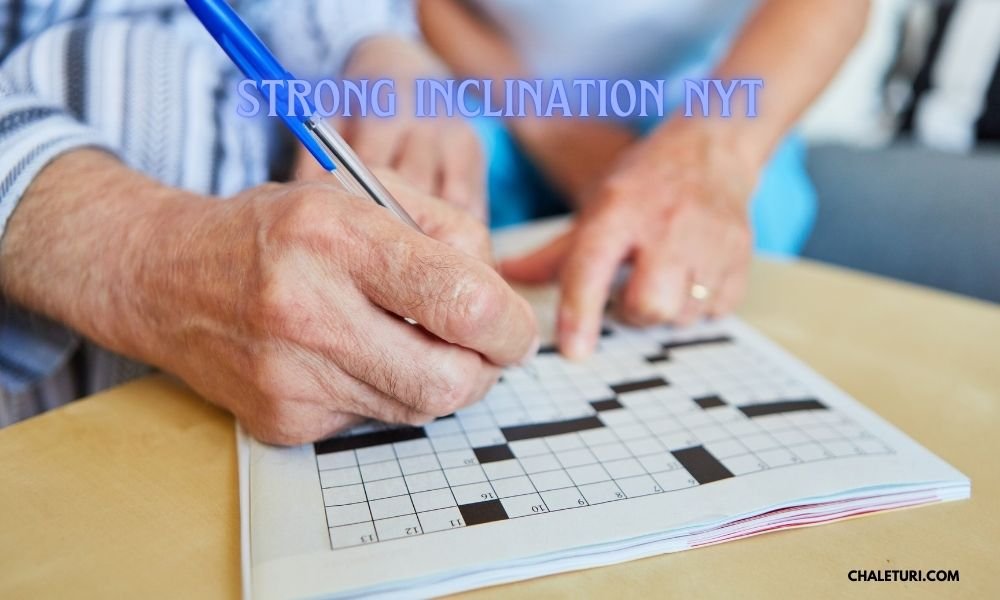Crossword lovers come together! If you have ever been seduced by the challenge of solving New York Times (NYT) crossword puzzles, you understand that the tissue of details used in every clue is just one piece in much bigger plays. But what do you do when you come across a clue that suggests some sort of strong lean? You should now proceed to the core and start peeling off various layers of history, culture and personal bias that makes these puzzles quite fun. In this blog post, let’s examine a specific approach to solving the NYT puzzles, namely such strategy as strong inclination NYT – tips and insights which will elevate your puzzle solving skills to a level where no puzzle will remain unsolved.
Understanding Strong Inclinations in NYT Puzzles
NYT puzzles have clues that involve clues which imply a strong inclination more often than not. An inclination means a tendency, that is, a notable domination towards something. Such clues tend to be quite rewarding in that the solver is challenged to think out of the box and to try to understand different contexts that may pertain to the answer. After going through all this, you may appreciate the intricacies of puzzle solving skills and even improve in it.
The Importance of Contextual Clue Interpretation
Perhaps, the most valuable skill needed in developing strong inclination clues when solving a puzzle is being able to understand the contextual nuances. These clues argue that one should make connections across events in the past, changes in society and most importantly mindsets of individuals. By speaking to contextual interpretation, these are claimed to be used in understanding deeper meaning and making solving out of wars in the puzzles more effective.
Historical Contexts and Strong Inclinations
Identifying the historical context accurately, becomes particularly important in solving the more complex puzzles designed for certain interest themes. The importance of history is that the information and pieces of evidence that are not instantly visible can be gathered.
The Evolution of Personal Travel Preferences
From the time people wrote to the foreign countries, to know when a foreign country indulges in travel, there has been an interesting development of an individual’s travel style. This change provides an aspect that helps to make sense of strong inclination clues.
- From Foreign Correspondence to Tourism: Initially, there were also reasons that involve travel like expanding ties through trade or diplomacy. At present, the pattern of inclination in most travel users is tourism and adventurism which exposes the changing trends of humanity.
- Recognizing Shifts in Personal Inclinations: Uncovering these changes helps in giving additional explanations. In relation to this aspect, strong inclination on the aspect of travelling could suggest some problem solutions related to travel.
Economic Trends and Export Inclinations
Trends in economies are of great essence in determining the strong inclination clues, more especially that of trade and exports.
- The Impact of British Exports to the U.S.: In specific epochs, British exports to the USA represented the top of the ‘economic pyramid’. This knowledge of the surrounding context can assist in solving subtle references in the puzzle.
- How Trade Patterns Influence Puzzle Clues: This can help delineate strong inclination themes from which trade patterns are argued. A case in point; an export religiously associated with some clime may be the clue.
Scientific and Political Inclinations
Elsewhere, puzzle solvers will also have to think of scientific developments and political works as they solve or think of concerns relating to strong inclination themes.
Carl Wilhelm Scheele’s Scientific Pursuits
Of all the chemists who have contributed one way or the other through the use of experiments, Carl Wilhelm Scheele was one of those most significant. His practices provide excellent material for the puzzle makers looking to have a touch of a scientific approach.
- The Role of Experimentation in Genius: Scheele was a man of experiment, and he certainly did not let himself down in terms of making new revolutionary inventions. There are also other such cases and clues, where knowledge of history is crucial for the hint-solving process.
- Translating Scientific Achievements into Puzzle Clues: Comprehending Scheele’s input allows the answers to build scientific principles around the puzzles.
Political Careers and Public Service Inclinations
The cases of politicians such as Pete Rouse have led to the beginning of interesting, public service biases where strong biases can be sourced.
- The Journey of Public Servants like Pete Rouse: Rouse’s career is a good representation of the risk of indefinite obligation to the service of the public. Politicians, figuring a possibility of such disappearing clues, may have to appreciate the arts of engaging with the much politically oblique, policy wise, cognitive people.
- Crafting Clues from Political Narratives: Turning political problems into puzzles entails dealing with both the history and the polity of the present.
Crafting Strong Inclination-Based Puzzle Clues
Knowing how to make strong inclination based puzzle clues for the solvers does assist the solvers in the process of solving the puzzle.
Techniques for Engaging Clue Creation
In my opinion crafting engaging puzzle clues requires balancing personal and historical contexts, complexity, and accessibility.
- Integrating Personal and Historical Contexts: Adding personal and additional historical contexts to the clues enhances the puzzle and creates more layers that the solver becomes immersed in.
- Balancing Difficulty with Accessibility: There are significant rewards for those that make a puzzle clue so difficult that the solver is almost intimidated and discouraged from solving it. Making sure this does not happen helps to keep the puzzle interesting to many.
Tips for Solving Puzzles with Strong Inclination Themes
Solving puzzles with strong inclination themes utilizes both analytical thinking and contextual knowledge.
- Identifying Patterns and Historical References: For most cases, finding some strong inclination clues to the puzzle will necessitate recognizing some patterns or historical figures. Focus on the recurrence of some elements or some motifs that may lead you to the further enhancement.
- Leveraging Contextual Knowledge for Solutions: Solving a difficult intergroup puzzle may be achieved by using other specifics such as valuable knowledge about cultures, historical events, and even one’s bias.
Enhancing Puzzle-Solving Skills Through Context
New York Times achieves the greatest mastery on solving these strong inclination themed puzzles not just by memorizing the game but by understanding the relevance of every clue in its appropriate context. Solving NYT puzzles these days makes one feel that there has to be a correlation between the answer and the surrounding context to solve a puzzle. It has become apparent that as one improves his=her knowledge on history, science, or politics, so does the person’s inclination to enjoy solving puzzles.
Encouraging a Deeper Understanding of Themes
Engaging with puzzles through the lens of strong biases right from the look aids in the appreciation of underlying themes and their viewing. It calls for solvers to delve into the history, geography, culture and human nature that add up in the development of these beautiful puzzles.
Conclusion
Working on strong inclination New York Times puzzles is sure to never disappoint one after the conclusion; It is only one that comes out the tasks which is fine. Knowing and applying contextual clues on detail and developing your mind will improve you as a puzzle solver and help you learn how to solve the complex real world. From a bioscope narrative to a medical achievement and political career, the success outcome will depend on your ability to integrate ideas. For those willing to pursue the subject of their choice there are many puzzle communities and other resources that provoke your intelligence and will let you extend your knowledge for an unlimited period.




